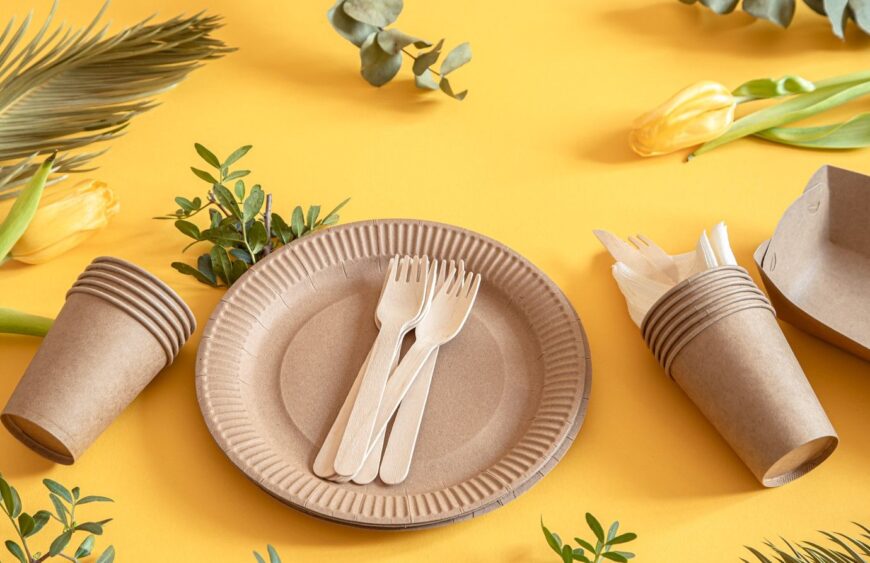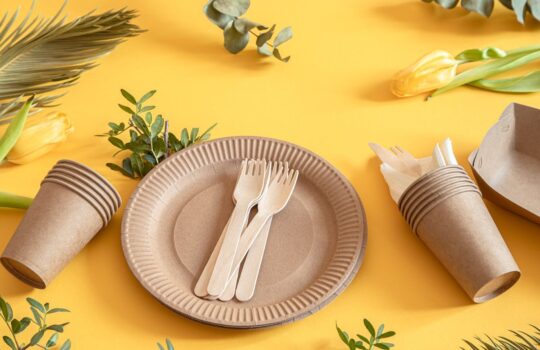As sustainability has become a key priority for the global food and hospitality industry, companies are increasingly adopting eco-friendly measures to reduce their environmental impact. With large-scale businesses such as restaurants, hotels, and catering services, the type of cutlery and drinkware used is very significant in developing a greener tomorrow.
Inclusive changes, such as wooden forks that can be composted, PET cups that can be recycled, and straws made from paper, not only benefit the environment but also boost brand image and client confidence.
In this blog, you will read about both the main advantages of eco-friendly cutlery and drinkware and the ways these products can help you build your business agenda and environmental motivations.
The Core Benefits of Eco-Friendly Cutlery and Drinkware for Food Businesses
Catering services, restaurants, and hotels handle hundreds, and even thousands, of customers daily. Using environmentally friendly cutlery and drinkware is not only a green choice, but it is also a business decision that is likely to yield tangible returns. Such benefits span operations, customer perception, compliance, and profitability in the long term.
Reduced Environmental Impact
The direct advantage is the decreased amount of non-biodegradable waste. The disposable plastic cutlery and glassware may take centuries to decompose, whereas compostable or recyclable materials reduce the amount of waste deposited in landfills.
Examples of eco-responsible alternatives:
- Wooden cutlery (forks, knives, spoons, both wrapped and unwrapped)
- Paper straws (8″ wrapped paper straws)
- Recyclable PET cold cups (12oz, 16oz, 20oz) and matching lids
- Coffee accessories like paper stir sticks, wooden sip stoppers, and paper dome lids
With this change, you will become one of the businesses that actively promote waste reduction and responsible consumption.
Improved Brand Image and Customer Trust
Modern consumers, especially those who frequent cafes, boutique hotels, and organic restaurants, take note of packaging choices. Businesses that offer sustainable packaging are seen as more ethical, future-focused, and premium.
- Displaying the use of eco-cutlery or recyclable cups shows customers that your values align with theirs
- Enhances brand positioning, especially in health-conscious or eco-conscious markets
- Encourages positive word-of-mouth and repeat business
Enhanced Hygiene and Food Safety
Hygiene is also an important issue, particularly when it comes to food on the go or take-out. Being environmentally friendly does not imply making safety sacrifices.
Key hygiene-focused packaging:
- Individually wrapped cutlery (wooden and plastic options)
- Coffee lids with tear-back, dome, or strawless designs
- 4-piece wooden cutlery sets, including napkins for added cleanliness
Customers can rest assured that such products will be handled and delivered safely.
Streamlined Operations and Consistency
Eco-friendly packaging often follows standard industry sizes and is designed with efficiency in mind.
- Cups available in 8oz, 10oz, 12oz, 16oz, and 20oz with matching lids
- Lid types include dome lids, strawless lids, X-slotted lids, and tearback lids, ensuring flexibility across drink types.
- 4-cup carriers and 96-oz Beverage on the Move containers simplify large-volume coffee orders for catering or office delivery
This uniformity allows for faster service, easier stock management, and fewer mismatched components.
Regulatory Readiness
The use of single-use plastics is being actively banned or restricted in many areas. Early adoption of sustainable packaging enables your firm to stay ahead of the curve or avoid fines and supply chain shortages.
- Replacing plastic forks, spoons, and straws with biodegradable or recyclable alternatives ensures your business is future-ready
- Avoids last-minute policy-driven supply changes
- Demonstrates leadership and responsibility in your industry
Convenience for On-the-Go Customers
Your packaging should suit the modern lifestyle: fast, mobile, and clean. Eco-friendly options are no longer flimsy or inconvenient. They are built for real-world use.
- Sturdy wooden cutlery for takeaway and deliveries
- Dome and sip lids that prevent spills
- Stir sticks, straws, and carriers are designed for functionality and portability.
These options can enhance the overall customer experience without complicating operations.
Long-Term Cost Efficiency
The cost per unit of sustainable packaging can sometimes be higher, but in many cases, it leads to increased business profits.
Cost advantages over time include:
- Reduced product waste due to better quality and durability
- Stronger customer loyalty from eco-conscious consumers
- Avoidance of future regulatory fines or last-minute replacements
- Bulk availability of standard SKUs like PET cups, coffee filters, and sleeves for consistent pricing
Planning with a reliable supplier reduces risk and ensures your margins stay strong.
Planetize Packaging: Eco-Friendly Packaging Designed for Real-World Food Service
Planatize Packaging partners with restaurants, hotels, and caterers to provide dependable, sustainable packaging built for busy, high-volume environments. Our range includes sturdy wooden cutlery in both wrapped and unwrapped options, clear PET cups in various sizes for cold beverages, and a comprehensive selection of paper and dome coffee lids in multiple colours and styles. We also offer thoughtful add-ons, such as stir sticks, paper straws, espresso cups, coffee sleeves, and filters, each designed to make service cleaner, easier, and more sustainable. With ready-to-ship bulk inventory and a commitment to quality, we help food businesses reduce waste without compromising on performance or presentation.
FAQs
What are the advantages of biodegradable cutlery?
The advantage of using biodegradable cutlery is that they are sustainable utensils, as opposed to normal plastic ones, which do not leave any harmful residues when broken down naturally. In the case of food businesses, it refers to reducing landfill waste and aligning with increased environmental demands from customers. It’s also increasingly compliant with regulatory shifts banning single-use plastics in many regions. Whether it’s wooden forks or compostable spoons, biodegradable options help businesses present a responsible image while maintaining functional performance for dine-in, takeaway, or catering use.
What are eco-friendly, safe kitchen utensils?
Environmentally friendly kitchen appliances are made from non-toxic materials of natural origin or recyclable materials, ensuring they are safe for people and the environment. Renewable alternatives, such as bamboo, silicone (BPA-free), stainless steel, or sustainably harvested wood, are among the most popular options. Such materials do not absorb chemicals into the food and are frequently reusable or decomposable.
Are eco-friendly products durable enough for commercial use?
Yes, there are many environmentally friendly products specifically designed to cater to the needs of commercial kitchens and high-volume food service operations. PET cups used for cold drinks are made of recyclable and durable materials, including heavy-duty paper tops. These options can be as trustworthy as traditional materials, provided they are sourced from quality suppliers and are thus suitable for use in busy restaurants, cafes, and catering companies.
Do customers notice sustainable packaging?
Absolutely. Today, consumers are better aware of environmental problems and closely examine how food is packaged. Embracing green products, such as coffee cups made from recyclable materials, biodegradable plates, and cutlery, or paper straws, indicates that your business requires more than profit to sustain itself, that it is responsible, and that it is contemporary. It may result in customer loyalty, positive reviews, and a competitive advantage over markets that are not willing to consider eco-friendly options.
Is switching to eco-friendly packaging expensive?
While the initial cost per unit may be slightly higher than that of traditional plastic items, eco-friendly packaging often leads to long-term savings. Return on investment is influenced by factors such as improved customer retention, compliance with regulations, and brand value. Most sustainable packaging processes are sold in large quantities, enabling businesses to sustainably manage costs without compromising ethics or quality.






